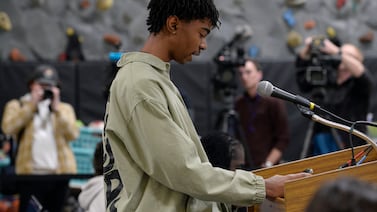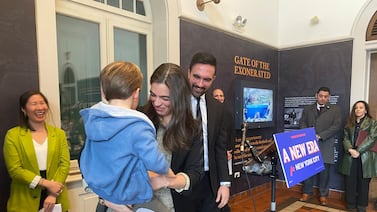Sign up for Chalkbeat Indiana’s free daily newsletter to keep up with Indianapolis Public Schools, Marion County’s township districts, and statewide education news.
This article was originally published by Mirror Indy, and is republished through our partnership with Free Press Indiana.
Corey Bass sits curled over a desk in the back of the room as a writing specialist guides him and a handful of other teenagers through a series of exercises.
Spend three minutes making a list of hobbies you enjoyed as a child. Take eight minutes to write a letter to your younger self. Think about what things bring you comfort at the end of a long day. List them in two minutes.
A few jot down ideas. Others look at their phones, headphones in ear, scrolling through social media. When it’s time to share, Corey answers just above a whisper.
“For the comfort thing,” he says, “I put that I like to read and write.”
The sophomore is one of a small group of students in Crispus Attucks High School’s creative writing club run out of the school’s new Vonnegut Youth Writing Center. The center, along with new programs at Arsenal Tech and George Washington high schools, largely replicates a long-standing writing center at Shortridge High School.
Together, the four writing centers partner with the Kurt Vonnegut Museum and Library to offer in-school tutoring, classroom support and creative writing opportunities with the help of four staff and 12 paid interns. Their team plays a key role in working with students like Bass to find their voice in writing, prepare for life after high school and even, for some students, better understand a language different from what’s used at home.
As Indianapolis Public Schools begins offering more classes for college credit, the writing centers are seen as a way to support teachers and students amid a collective push for more academically challenging coursework.
But with a major source of funding going away at the end of the year, leaders are looking for ways to continue paying the tutors who work with the students every day.
Expanding the writing center model
IPS first introduced writing centers across the district six years ago to help students prepare for college or career opportunities.
However, many of the programs went away after a few years, Writing Center Coordinator Chris Speckman said, when grant funding ended. Only Shortridge held onto its center, he said, because administrators saw value in continued support for the school’s writing-heavy International Baccalaureate program.
IB is a challenging, college-focused academic program offered to IPS high schoolers only at Shortridge. Eighteen percent of Shortridge students received an A, B, or C on their rigorous IB extended essays in 2018.
Five years later, as the writing center continued, that number was up to 64%.
With federal pandemic relief funds available, Speckman pushed last school year to expand the writing centers across all IPS high schools. Its timing just happened to align with the district’s rollout of greater dual credit opportunities, allowing students at Arsenal Tech, Crispus Attucks, and George Washington to take classes like English composition and career exploration for college credit in partnership with IUPUI and Ivy Tech Community College.
“If we’re going to steer kids toward these classes, we want to see everybody succeed,” Speckman said, “and we’re not just leaving it to them to fend for themselves.”
At IPS’ largest high school, Arsenal Tech, the writing center, with its vast open floor plan and expansive mezzanine, frequently hosts class visits. An AP physics teacher, for example, might book the center so writing specialist Carrie Gaffney can work with students on scientific essays. Gaffney also organizes monthly meetings of 60 or so early college freshmen and sophomores to share advice for navigating their advanced classes. The center is looking to add math tutoring soon.
“In my experience, every kid that comes in here wants to do better,” Gaffney said. “They want to be taught, and they want to be successful.”
At George Washington, the district’s smallest center, writing specialist Erin Brock frequently visits classrooms. She joins teachers’ professional development meetings and has been working with them as they introduce more writing-heavy lessons this year.
Her George Washington center shares a door with the school’s Future Center, which helps students find and apply for scholarships, prepare for job interviews and learn about life after high school. That means Brock frequently assists students with scholarship essays and other writing needed for students on track to college.
The writing centers best help students reach their goals, specialists say, when working together with the rest of the school. Brock said at George Washington, it took time to explain the center’s purpose and build trust with teachers and students.
“It went from barely being able to get a student or two in the room,” Brock said, “To now I have too many kids in the room and people coming in at all times.”
A support for classroom learning
The writing centers can serve as a key resource for teachers who may not have the time or ability to work with students individually on a regular basis. Specialists see students of all different writing abilities and multiple interns tutor in other languages, extending support to students who speak Spanish, French and Yoruba.
Speckman said the writing centers can also support classroom teachers who are early in their career, are not English instructors or generally are not confident in their ability to teach writing.
“Part of what we’re trying to do is to also be that lifeboat,” Speckman said. “We have these lessons in place, we have these ideas, we have these scaffolds. Let us make your life easier so you don’t feel overwhelmed.”
The centers also provide a quiet space for students to study in a low-pressure environment where specialists treat students as peers. Because many of the Vonnegut interns are college students themselves, they can help answer questions and share their own examples of what to expect in college.
Aside from serving an academic need, writing specialists say they’re also there to help students develop their interests in creative writing, including short fiction and poetry. Crispus Attucks and Shortridge have creative writing clubs, and Arsenal Tech and George Washington are hoping to start their own soon.
“We’ve got a lot of creative writers so it’s just about giving them more opportunities,” Brock said, “just something to get our students more engaged in writing as a whole and getting their creativity out.”
Planning for the future
The centers at Arsenal Tech, Crispus Attucks and George Washington have almost completed their first years, and students are just now entering the busy spring testing season. If Shortridge’s long-standing program is an example for how well others could do, Speckman said he expects to see growth in other high schools, too.
The centers have collectively seen 2,281 students between last August and January, accounting for about 41% of all IPS high schoolers, putting the centers well on their goal to see half of the high school student population by the end of the year.
However, with federal pandemic grants soon coming to an end, Speckman said he’s looking to other areas for funding. IPS has committed support through another federal grant to sustain the district’s four writing specialists for at least the next school year, but the centers will look to other sources to pay for its interns. Speckman said the centers also are always searching for volunteers.
“That’s going to be the big thing,” Speckman said. “If we’re outgrowing some of our spaces because they’re so busy, can we find the right capacity in all of these spaces to make sure that we can do everything in the building that is a need? Because, I think you can always do more.”
That’s a welcome idea to Robertha Chalestra, a “frequent flyer” in George Washington’s writing center. The junior, whose first language is Haitian Creole, visits regularly for help with English, history and math — but mostly to hang out and see “Miss Erin.”
“Last year, I was struggling,” Chalestra said. “I had like one teacher that was always helping, but he had class and other kids to help, too, so … having Miss Erin here and the tutors is a really great thing.”
Mirror Indy reporter Carley Lanich covers early childhood and K-12 education. Contact her at carley.lanich@mirrorindy.org or follow her on X @carleylanich.




